Rising stars: Meet the Conservative Party’s ambitious young MPs
Rishi Sunak (Credit: PA Images / Alamy Stock Photo)
10 min read
Could the Conservative Party’s ambitious young MPs be the answer to its woes? Tom Scotson speaks to a few of them
A year on from their last party conference, the Conservatives remain significantly behind in the polls. The government has held two leadership elections, been through three prime ministers, and been hit by a succession of scandals. It’s clear the electorate has grown increasingly tired of the psychodrama in the Tory Party.
Yet despite this turbulent period of political history, the Tories have not exhausted their pool of talent. A caucus of ambitious millennials, who hold relatively safe seats, have garnered respect across its inner factions. After the next election, they are likely to hold power within the Conservative Party – and potentially the country.
Laura Trott
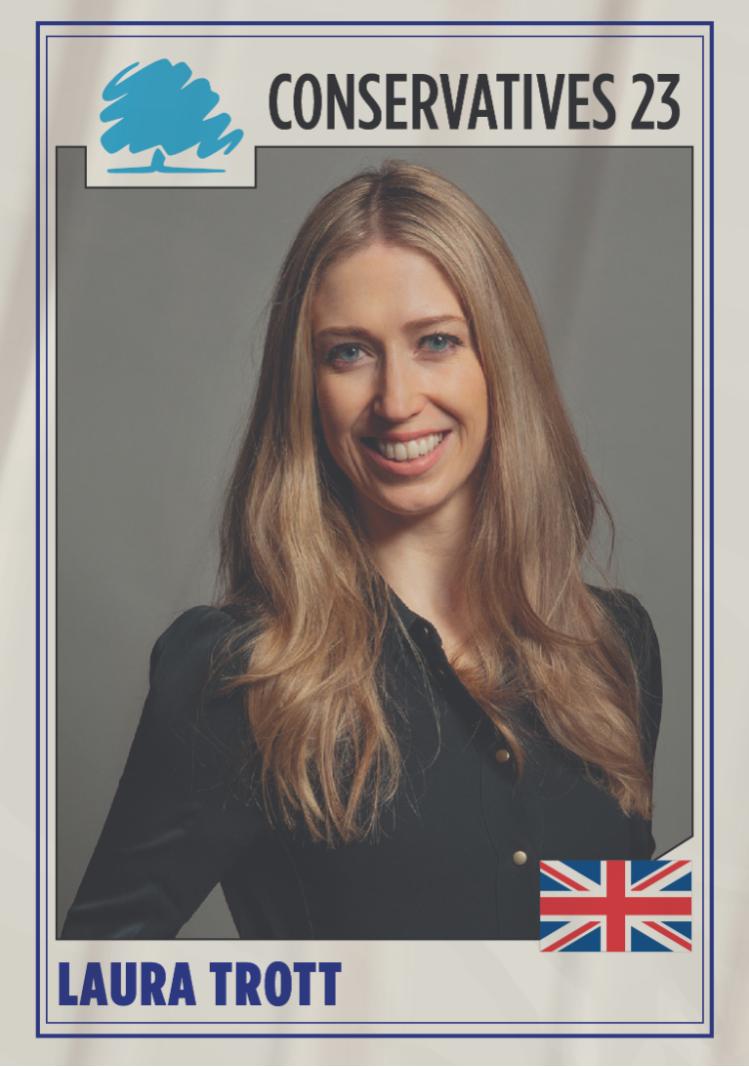 Laura Trott (Credit: UK Parliament)
Laura Trott (Credit: UK Parliament)
Laura Trott is a prime example of a rising star within the Conservatives’ 2019 intake. The pensions minister is respected across the Tory Party, enthusiastic about her brief – “I love what I’m doing … I get to go and make people’s pensions better” – and renowned among staff and colleagues for being on top of the detail.
She admits, however, that working in politics has raised a few eyebrows at home.
“I’m not from a political family at all,” she says. “I mean, my family think I’m slightly mad to be doing this job.”
The 38-year-old, who represents Sevenoaks, went to a state school just outside her constituency before studying at Oxford University.
“I remember seeing John Major as prime minister and just thinking, he went to a state school as well. This is a career path which is possible for me,” she says.
Trott later took a job as a special adviser in Westminster, before moving over to No 10, where she worked in David Cameron’s inner team and co-authored his election-winning manifesto.
“It’s not a job, it’s a lifestyle working in No 10,” she candidly admits.
She views her job as an MP and a minister as a calling in life, and a pathway she wanted to pursue from a “freakishly” young age.
“In the same way that being a doctor or nurse is vocational, politics is vocational,” she adds.
Trott has always viewed herself as a staunch Conservative. “I’ve been in the Conservatives since I was a teenager,” she says. “It’s always been my home, politically.”
Her brand of Conservatism resonates with the party’s moderate wing. She believes in fierce competition while also delivering for the “poorest people in our society”.
Trott is also sharp, and quick to shut down questions being thrown at her. What, for instance, does she think of the proposals not to raise benefits in line with inflation?
“It’s a matter for the Secretary of State [for Work and Pensions],” she counters. “So, it’s probably not appropriate for me to comment.”
Finally, were Rishi Sunak to offer her a promotion, would she accept it? “I am very happy where I am,” she replies.
David Johnston
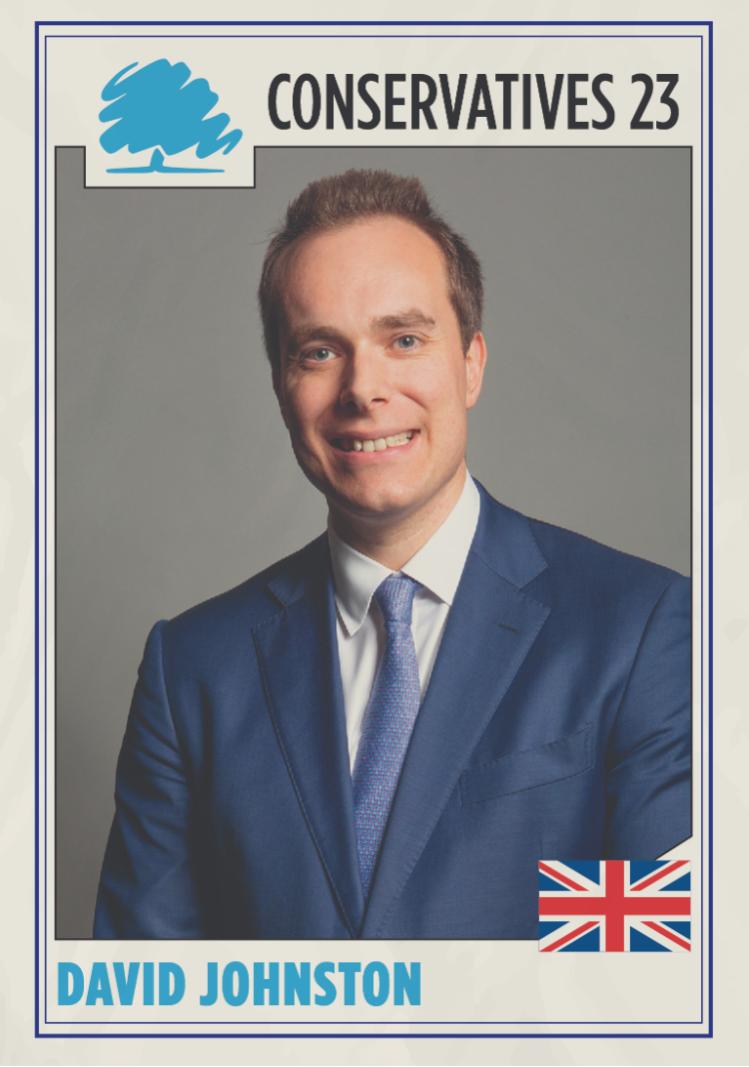 David Johnston (Credit: UK Parliament)
David Johnston (Credit: UK Parliament)
When approached for this interview, David Johnston was slightly surprised to be considered a rising star. A few days later, he was appointed children’s minister, and became the newest member of Rishi Sunak’s government.
The role complements Johnston’s passion for social mobility, which he believes has been central to his own life.
“Before I was elected in December 2019, I had never been in politics before. I’d never been a candidate, councillor, special adviser, nothing,” he says.
“The school I went to had a 20 per cent GCSE pass rate, before they included English and Maths.
“My dad left school at 14, my mum left at 16. I was first in my family to go to university,” he adds.
Prior to Westminster, Johnston was chief executive of the Social Mobility Foundation, which provides opportunities for young people from disadvantaged backgrounds.
With his experience in the charity sector, which is often associated with left-wing politics, what attracted him to the Conservative Party?
“A big thing that makes me a Conservative is that I don’t think the state can solve every problem,” he says.
“Sometimes it’s charities that are best placed. Sometimes it’s businesses that are best placed. Sometimes it’s schools or universities.”
The MP for Wantage does believe in a strong state, but the prevailing view that the government can solve all Britain’s problems, he claims, has “influenced” some of what his own colleagues “now think”.
“We’ve slightly come out with an attitude now that whenever there is a problem, it’s the government’s to fix,” he says.
“That takes away agency from charities, from businesses, from individuals, from families.”
Alicia Kearns
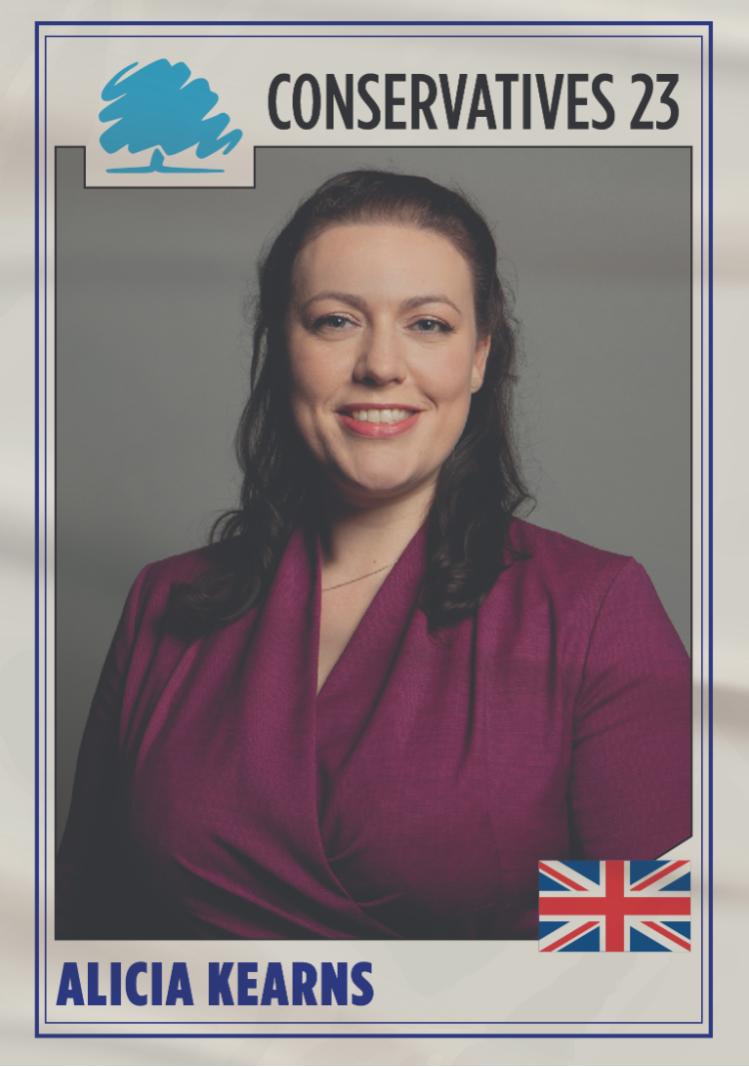 Alicia Kearns (Credit: UK Parliament)
Alicia Kearns (Credit: UK Parliament)
Alicia Kearns has become a familiar face around Westminster. Like many of her contemporary rising stars, she was elected in 2019. In 2022, she was elected chair of the Foreign Affairs Select Committee, and has become a leading voice on the rise of China.
Kearns grew up in a “very left-wing household”, and admits she was a Labour voter in the past. Despite this, politics did not dominate her youth.
The 35-year-old studied social and political sciences at Fitzwilliam College, Cambridge, where she claims to have done “no work” and spent her time “having fun” and “doing theatre”.
“In my first week, I went to the Cambridge Union and I was so intimidated. I walked in, and there were just these posh boys in their posh black ties. And they were all talking in a language that I don’t use,” she adds.
“I was there for 20 minutes. I just walked back to my college and never went again. Politics was not a part of my life at Cambridge.”
With no strong political background, what compelled Kearns, who had worked in communication roles for the Ministry of Defence and the Foreign and Commonwealth Office, to stand for Parliament?
“I didn’t feel when I watched the debates in Parliament … we had many people who understood national security – definitely not counter-terrorism,” she explains.
“I felt it’d be quite good to have more people with that background. And I lost my mind!”
Kearns, MP for Rutland and Melton, has one of the safest seats in the country. Whatever the result of the next election, she is likely to be in Westminster and hold a strong position.
So, would she consider becoming a minister at one stage?
“There are too many people whose sole focus is being a minister,” she says. “Am I saying I don’t want to be minister? No, I’m not. But I’m not in a rush.”
Bim Afolami
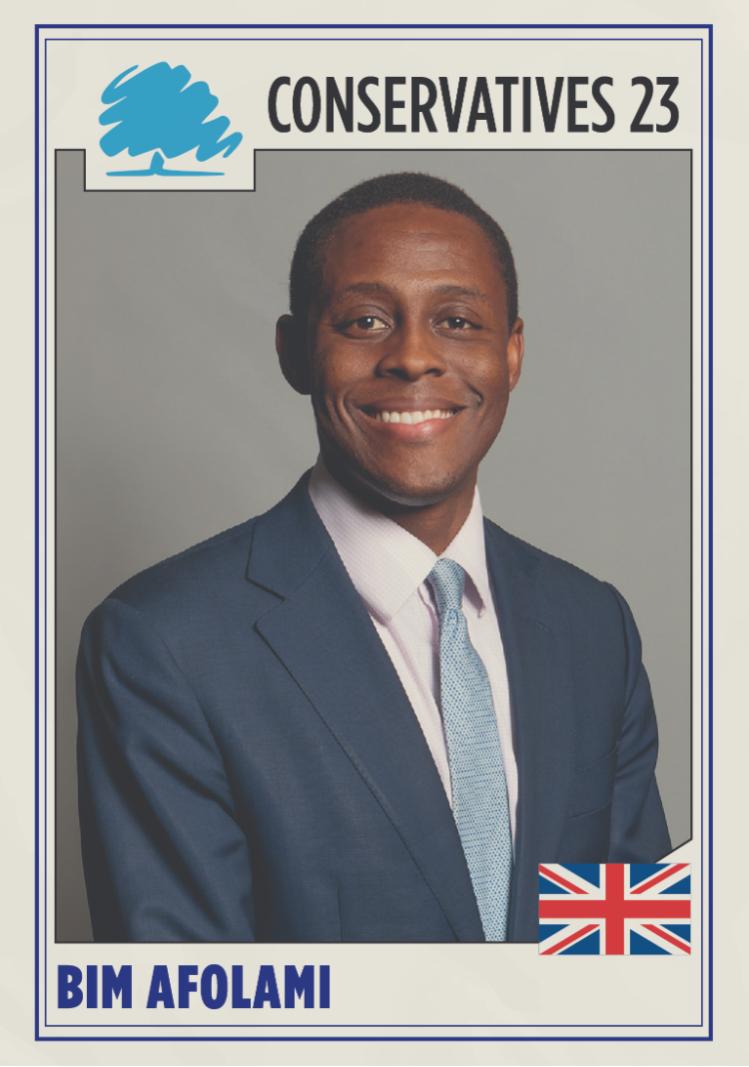 Bim Afolami (Credit: UK Parliament)
Bim Afolami (Credit: UK Parliament)
Bim Afolami is passionate about getting young people involved in the party. This year, he helped set up the Next Gen Tories, a back bench campaign group aiming to win the support of generation Z and millennials.
“We can’t treat younger people as sort of nice-to-haves, or add-ons,” he insists. “They’ve got to be absolutely critical to our re-election efforts.”
Afolami grew up in Berkshire and then Surrey, where he says he was very sporty in school.
He worked at the City law firm Freshfields for three years, followed by three years at Simpson Thatcher and Bartlett LLP as a corporate lawyer.
He entered Parliament aged 31, representing Hitchin and Harpenden after taking over from the “great” Peter Lilley.
“I’d replaced a Conservative Party legend,” Afolami says. “That isn’t too strong a word to use about Peter Lilley, now in the Lords, who’s a great man. He’s been a fantastic support to me since.”
Afolami’s brand of Conservatism is very clear, underpinned by “freedom, opportunity and tradition”.
One of his overarching missions is to broaden the Tory Party’s base, which is now heavily dependent on pensioners.
“If you are thinking about the future for younger people, particularly the future for our party, younger people have to be a part of that,” he says. “Because after a period of time, you aren’t going to have a party if younger people are not.”
After the election, he could be crucial in the battle for the long-term survival of the Conservatives.
Laura Farris
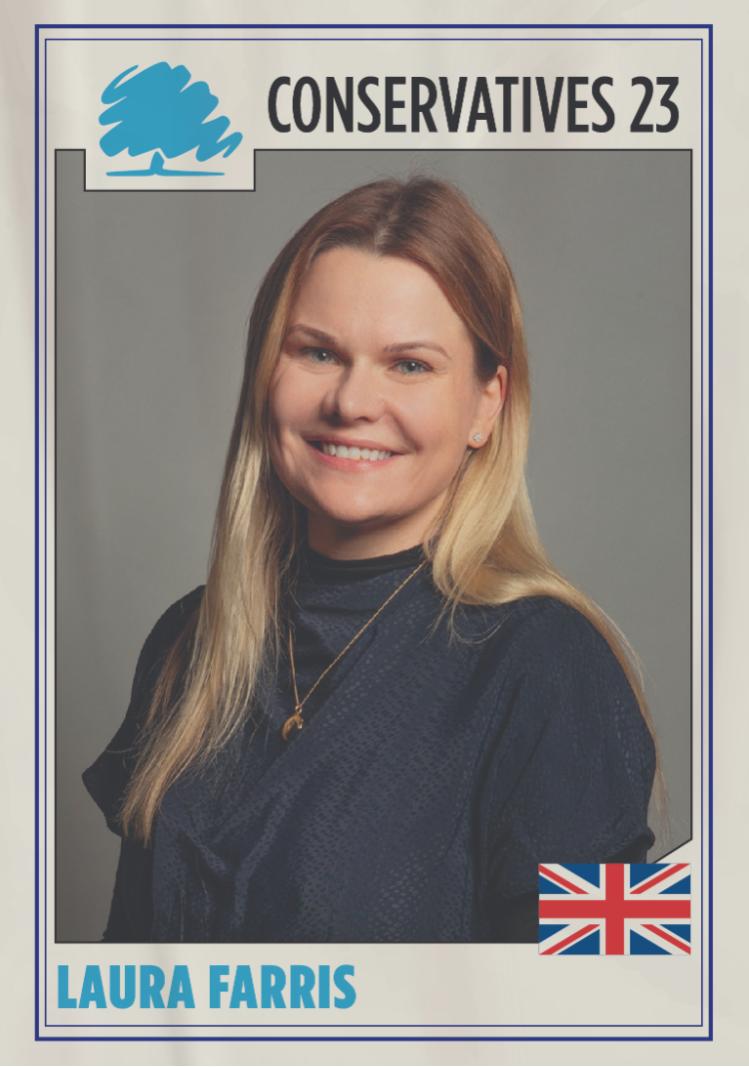 Laura Farris (Credit: UK Parliament)
Laura Farris (Credit: UK Parliament)
Laura Farris represents the same constituency as her late father. He died when she was 14 years old in 1993, and she claims not to have had a “golden pathway” into politics.
Nonetheless, her father’s enthusiasm for Westminster has stuck with her – and was central to Farris’s younger years.
“It is true that when I was really young, all the chat around our kitchen table in the evenings was about politics,” she says. “It was almost non-negotiable.”
Farris was educated at Lady Margaret Hall, Oxford, where she studied philosophy, politics and economics.
She never got involved in student politics, which she found “contrived”. “I thought it looked [like] children acting like politicians,” she says.
After university, Farris worked in America as an intern and researcher for Hillary Clinton in 2003. A year later, she moved over to journalism, and worked for BBC News on the 2004 US election.
“I wasn’t a natural journalist, really ... I wanted to have a job that was quite directly involved in people’s lives.”
Farris spent most of her professional career as a barrister, and predominantly focused on cases where there was a strong public interest.
But after she had children, she decided she wanted another career change.
“I didn’t want to, as my kids got older, go back to just the kind of churn of working as a lawyer, case by case by case,” she admits.
“I wanted to have a job that was public facing, using the skills I had developed as an advocate.
“I kind of knew then that it was time to try to become an MP.”
After fighting a seat for the Conservatives unsuccessfully in east London in 2017, Farris was selected for her home seat in Newbury two years later.
She says being a back bench MP is a “huge responsibility” and a “privilege”.
But, if the opportunity arose, would she fancy her chances in Sunak’s top team?
“I would like to serve in government one day, because there’s no doubt you can only really be effective when you are in government.”
Ranil Jayawardena
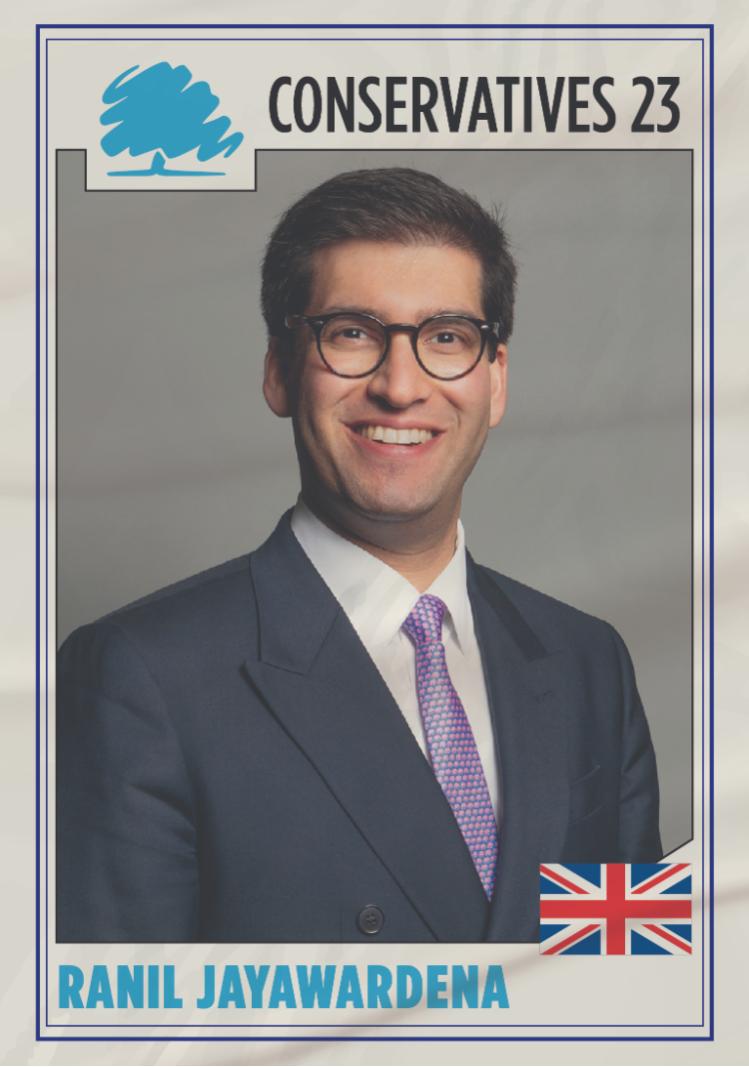 Ranil Jayawardena (Credit: UK Parliament)
Ranil Jayawardena (Credit: UK Parliament)
Elected in 2015, Ranil Jayawardena has a significant amount of ministerial experience under his belt.
He served as deputy chair of the Tory Party in 2020 before being promoted to minister for international trade, and then had a brief stint in the Cabinet as environment secretary under Liz Truss.
Despite sitting on the back benches, he now chairs the influential Conservative Growth Group, made up of 60 MPs, which promotes “pro-growth” free market ideas.
“It’s an inherently Conservative thing to want to grow the economy to make sure that people have better jobs tomorrow than they do today, that our children and grandchildren live better lives than us,” he says emphatically.
When Jayawardena was growing up, his father talked about politics around the dinner table with him and his siblings.
He went to a state school in north-east Hampshire and later studied at the London School of Economics and Political Science.
Jayawardena became a member of the Conservative Party in 2003 when Michael Howard became leader.
“There was a sense then that the party really needed to come together,” he explains.
With the relatively safe seat of North East Hampshire, where he has a majority of more than 20,000, would Jayawardena accept a role on the front bench again?
“It’s of course a huge privilege to serve in government,” he says. “To have those levers available to me again would, of course, be a great privilege. But let’s not sign away my freedom to speak out too soon.”
